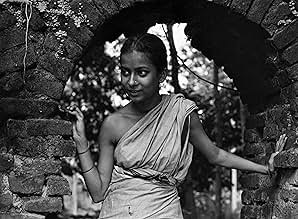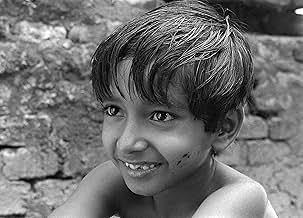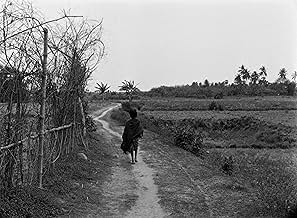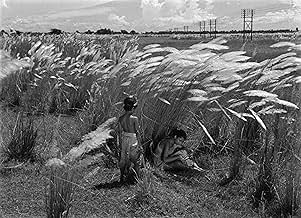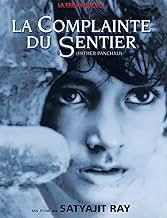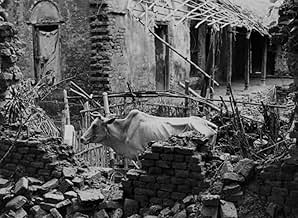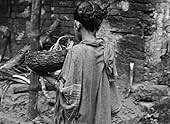Impoverished priest Harihar Ray, dreaming of a better life for himself and his family, leaves his rural Bengal village in search of work.Impoverished priest Harihar Ray, dreaming of a better life for himself and his family, leaves his rural Bengal village in search of work.Impoverished priest Harihar Ray, dreaming of a better life for himself and his family, leaves his rural Bengal village in search of work.
- Director
- Writers
- Stars
- Nominated for 1 BAFTA Award
- 11 wins & 3 nominations total
Kanu Bannerjee
- Harihar Ray
- (as Kanu Bandyopadhyay)
Karuna Bannerjee
- Sarbojaya Ray
- (as Karuna Bandopadhyay)
Subir Banerjee
- Apu Ray
- (as Subir Bandopadhyay)
Uma Das Gupta
- Durga
- (as Uma Dasgupta)
Runki Banerjee
- Little Durga
- (as Runki Bandopadhyay)
Haren Banerjee
- Chinibas, Sweet-seller
- (as Haren Bandyopadhyay)
Roma Ganguli
- Roma
- (as Rama Gangopadhyay)
Binoy Mukherjee
- Baidyanath Majumdar
- (as Binoy Mukhopadhyay)
- Director
- Writers
- All cast & crew
- Production, box office & more at IMDbPro
Featured reviews
10zetes
It is a little known fact that India produces more films per year than any other country. The reason that most people don't know that is because their films do not generally appeal to us, and we would see them as oddities suspended in their own culture. Possibly they'd be amusing or interesting to watch, but they would probably be hard to enjoy (to demonstrate the difference in taste, Roger Ebert attended an Indian film festival a year or two ago, and when he questioned its director what American film did the best business over there, he answered that the movie _Baby's Day Out_, which is basically like one of those Popeye cartoons where Sweet-Pea wanders through construction sights blindly, except extended to 90 minutes, had theaters packed in India all throughout its run; the film bombed completely in the US). Tastes differ. Humanity does not. This is proved to the utmost in Ray's masterful _Pather Panchali_.
This film has got to be the best ever made about, well, life in general. It reminded me a lot of a Chinese film, Zhang Yimou's _To Live_, which was good, but its situations finally seemed a bit contrived. _Pather Panchali_ feels as real as life itself. To be sure, it contains great moments of sadness, but, for the most part, it concentrates on the beauty of the world around us. One of the major characters is this ancient woman, maybe even in her nineties. She is hunched over, has no teeth, and has crooked eyes. But Ray makes her form beautiful. He often finds characters with exaggerated and odd features. And there is nothing more beautiful in this world than the love between members of a family, and Ray revels in this. The relationship between the brother and sister is heartstoppingly beautiful.
I could not say anything bad about this film. But there is one thing I would like to see: a DVD version of this film, and indeed of each of the films of the Apu Trilogy, and only Criterion could do this effectively, which is kind of disappointing, since I know a major film company already owns its rights and would probably never give them up without huge pay; a DVD version with scholarly commentary. Hindu symbology is present in a large quantity in this film, along with several Hindi ceremonies. Of course, I loved seeing this. I am not completely unfamiliar with the culture, so I was able to catch a little, but there is so much I don't know. A commentary track on a DVD would help me understand the film better, and thus love it even more.
This film has got to be the best ever made about, well, life in general. It reminded me a lot of a Chinese film, Zhang Yimou's _To Live_, which was good, but its situations finally seemed a bit contrived. _Pather Panchali_ feels as real as life itself. To be sure, it contains great moments of sadness, but, for the most part, it concentrates on the beauty of the world around us. One of the major characters is this ancient woman, maybe even in her nineties. She is hunched over, has no teeth, and has crooked eyes. But Ray makes her form beautiful. He often finds characters with exaggerated and odd features. And there is nothing more beautiful in this world than the love between members of a family, and Ray revels in this. The relationship between the brother and sister is heartstoppingly beautiful.
I could not say anything bad about this film. But there is one thing I would like to see: a DVD version of this film, and indeed of each of the films of the Apu Trilogy, and only Criterion could do this effectively, which is kind of disappointing, since I know a major film company already owns its rights and would probably never give them up without huge pay; a DVD version with scholarly commentary. Hindu symbology is present in a large quantity in this film, along with several Hindi ceremonies. Of course, I loved seeing this. I am not completely unfamiliar with the culture, so I was able to catch a little, but there is so much I don't know. A commentary track on a DVD would help me understand the film better, and thus love it even more.
10ballweg
I originally saw the Apu trilogy in 1961 in a little theater in Berkley. Sat through a straight showing of all three films and walked out after six hours in awe. It was a defining day in the development of an avid film buff. I have waited three years for the DVDs to be released, and hoped against hope that Criterion would get the rights, but it was not to be. Sony has released an unadorned, Mirchant and Ivory Foundation restoration: but they are finally available. I bought all three of the Trilogy the day they were released, but have been reluctant to put them on. So many of my memories of "great" films have made me wonder what I was on when I saw it to think that was great. Think "Brewster McCloud." My experience of Pather Panchali and the full trilogy was a memory I didn't want diminished in any way. Tonight I came home from work, put the Pather Panchali in and sat totally rapt for the full two hours. The DVD production values and the print quality are really bad in spots, but all that fades as one of the really great art films takes over, and the immersion in the lives behind the film works its magic. Film doesn't have to be an act of corporate commerce: Pather Panchali is living proof that film can be a medium of great art.
There is this one scene in Satyajit Ray's Pather Panchali when the eruption of a conflict between Apu's family and a quarrelsome neighbour brought the film to a complete standstill (for me anyway). Those few characters' state of mind and their relationship dynamics at that point in time, was conveyed with such explosive intensity, I got gut punched drunk.
Pather Panchali boasts of suitably melodramatic yet highly intuitive performances. Its breath taking cinematography ranks alongside existential beauty this side of Malick heaven. The musical scoring, by the great Ravi Shankar, is identifiably Indian, yet universally sublime. Together, these myriad parts melded into a whole so grand in its social consciousness, so incisively intimate in its portrait of one family, I could do nothing but be slowly devoured like a most willing prey.
On 4th Oct 2003, I saw my all time favourite film, Tokyo Story. The feeling I got today from Pather Panchali, is as close as is possible from that fateful October day.
Pather Panchali is one of the best films I have ever seen. This will be a night to remember. Now on with the other two then.
Pather Panchali boasts of suitably melodramatic yet highly intuitive performances. Its breath taking cinematography ranks alongside existential beauty this side of Malick heaven. The musical scoring, by the great Ravi Shankar, is identifiably Indian, yet universally sublime. Together, these myriad parts melded into a whole so grand in its social consciousness, so incisively intimate in its portrait of one family, I could do nothing but be slowly devoured like a most willing prey.
On 4th Oct 2003, I saw my all time favourite film, Tokyo Story. The feeling I got today from Pather Panchali, is as close as is possible from that fateful October day.
Pather Panchali is one of the best films I have ever seen. This will be a night to remember. Now on with the other two then.
This is a tour de force around a family's quest for that better future amidst sheer poverty. The film's success is not limited only to realistic depiction of human condition in early 20th century Bengal, but it brings up the triumph of human spirit, love and affection in spite of utter struggle in the most poignant way that one may think. Anybody remotely connected with movie making should also watch APARAJITO AND APUR SANSAR, to complete the experience, and off course to understand the art and craft of cinematic expression from the Maestro. No doubt it ranks in top 100 movie list from Time magazine, not to speak of almost all Indian publications connected with films rate this one as THE MOVIE.
What a wonderful film. For those who have not watched any films from India or heard of Ray, I strongly recommend it. Full of sadness, hope, innocence, and despair, it is an emotionally evocative portrait of the life of an Indian family, their trials, and their courage and persistence throughout. They go on, not because they are exceptional, but because they must, because they are human.
Ray does a masterful job of capturing the simple joys of childhood, and the ambitions and dreams which make us all human, regardless of where we are. Simple scenes such as a disfigured elderly woman seated on a porch, singing of her approaching death, are very moving. I have never seen the basic elements of life treated with such an incisive yet soft touch as Ray has in this film. It is wonderful to watch in comparison to the broad writing strokes and vulgar generalities of most directing and writing today. At the risk of sounding trite, this is a film which is not merely entertainment or art, but one which reaches into your heart and makes a place for itself there. It belongs there.
Ray does a masterful job of capturing the simple joys of childhood, and the ambitions and dreams which make us all human, regardless of where we are. Simple scenes such as a disfigured elderly woman seated on a porch, singing of her approaching death, are very moving. I have never seen the basic elements of life treated with such an incisive yet soft touch as Ray has in this film. It is wonderful to watch in comparison to the broad writing strokes and vulgar generalities of most directing and writing today. At the risk of sounding trite, this is a film which is not merely entertainment or art, but one which reaches into your heart and makes a place for itself there. It belongs there.
Did you know
- TriviaHalfway through filming, Ray ran out of funds. The Government of West Bengal loaned him the rest, allowing him to complete the film. This loan is listed in public records at the time as "roads improvement", a nod to the film's translated title.
- GoofsAlthough the film is set in early 20th-century rural India (a time in which public health campaigns presumably did not exist), when Apu and Durga are shown hiding in the fields waiting to catch a glimpse of the train, a vaccination mark is clearly visible on the right arm of Uma Das Gupta, who portrays Durga.
- Alternate versionsThere is an Italian edition of this film on DVD, re-edited with the contribution of film historian Riccardo Cusin. This version is also available for streaming on some platforms.
- ConnectionsFeatured in Century of Cinema: And the Show Goes On: Indian Chapter (1996)
- How long is Pather Panchali?Powered by Alexa
- What relation are the actors?
Details
- Release date
- Country of origin
- Official site
- Language
- Also known as
- Song of the Little Road
- Filming locations
- Boral, West Bengal, India(entire movie)
- Production company
- See more company credits at IMDbPro
Box office
- Gross US & Canada
- $134,241
- Opening weekend US & Canada
- $16,064
- May 10, 2015
- Gross worldwide
- $135,342
- Runtime2 hours 5 minutes
- Color
- Aspect ratio
- 1.37 : 1
Contribute to this page
Suggest an edit or add missing content



